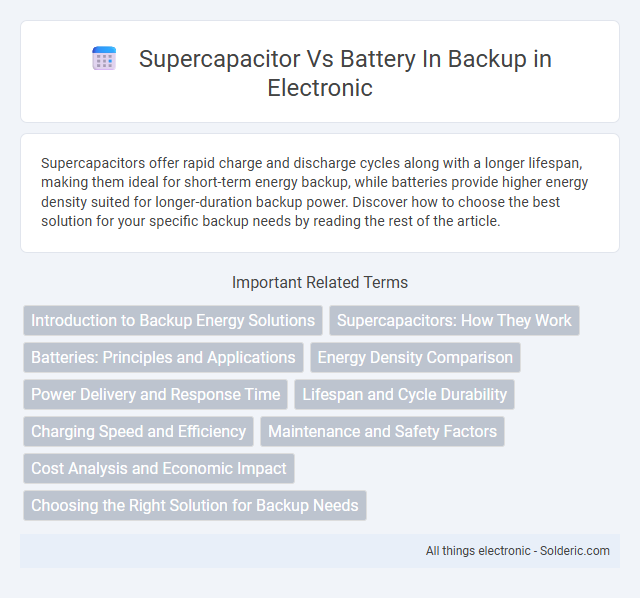Supercapacitors offer rapid charge and discharge cycles along with a longer lifespan, making them ideal for short-term energy backup, while batteries provide higher energy density suited for longer-duration backup power. Discover how to choose the best solution for your specific backup needs by reading the rest of the article.
Comparison Table
| Feature | Supercapacitor | Battery |
|---|---|---|
| Energy Density | Low (5-10 Wh/kg) | High (100-250 Wh/kg) |
| Power Density | Very High (up to 10,000 W/kg) | Moderate (100-1000 W/kg) |
| Charge/Discharge Speed | Fast (seconds to minutes) | Slower (minutes to hours) |
| Cycle Life | Over 1 million cycles | Few hundred to few thousand cycles |
| Self-Discharge Rate | High | Low |
| Temperature Range | Wide (-40degC to 65degC) | Limited (-20degC to 60degC) |
| Maintenance | Low | Moderate to High |
| Cost | Higher initial cost | Lower initial cost |
| Best Use Case | Short-term backup, rapid power delivery | Long-term backup, energy storage |
Introduction to Backup Energy Solutions
Supercapacitors and batteries serve as critical backup energy solutions, with supercapacitors offering rapid charge and discharge cycles and extended lifecycle durability compared to traditional batteries. Batteries, such as lithium-ion and lead-acid types, provide higher energy density suitable for longer backup durations but suffer from limited cycle life and slower recharge rates. The choice between supercapacitors and batteries depends on specific backup power requirements, including response time, energy capacity, and lifecycle considerations.
Supercapacitors: How They Work
Supercapacitors store energy through electrostatic charge separation at the interface between an electrolyte and an electrode, enabling rapid charge and discharge cycles with high power density. Unlike batteries, which rely on chemical reactions to store energy, supercapacitors offer longer cycle life and better tolerance to extreme temperatures, making them ideal for short-term backup applications requiring quick bursts of energy. Your backup system benefits from supercapacitors' durability and fast energy delivery, though they typically provide lower energy density compared to batteries for long-duration power supply.
Batteries: Principles and Applications
Batteries operate on electrochemical principles, storing energy through reversible chemical reactions that enable high energy density and long-duration backup power. Common battery types like lithium-ion and lead-acid are widely used in backup systems due to their reliability and scalability. Applications span from uninterruptible power supplies (UPS) to renewable energy storage, where consistent and prolonged energy delivery is critical.
Energy Density Comparison
Supercapacitors have significantly lower energy density compared to batteries, meaning they store less energy per unit volume or weight. While batteries can hold large amounts of energy suitable for long-term backup, supercapacitors excel in rapid charge and discharge cycles, making them ideal for short-term power support. Your choice depends on whether you prioritize quick energy delivery or sustained backup duration.
Power Delivery and Response Time
Supercapacitors excel in power delivery with rapid charge and discharge capabilities, providing almost instantaneous response times ideal for applications requiring quick bursts of energy backup. Batteries, while storing higher energy density, have slower response times due to chemical reactions during power delivery, making them less effective for immediate power needs. Your choice between supercapacitors and batteries for backup should consider whether fast response time or longer energy storage is the priority.
Lifespan and Cycle Durability
Supercapacitors offer significantly longer lifespan and higher cycle durability compared to traditional batteries, often exceeding one million charge-discharge cycles without substantial capacity loss. Batteries typically degrade after a few hundred to a few thousand cycles due to chemical wear, reducing their effectiveness in backup applications. Choosing a supercapacitor for your backup system ensures extended reliability and lower maintenance costs over time.
Charging Speed and Efficiency
Supercapacitors offer significantly faster charging speeds than batteries, typically charging within seconds to minutes compared to batteries that may take hours. Their high charge-discharge efficiency, often exceeding 90%, ensures minimal energy loss during operation, whereas batteries can experience efficiency losses due to internal resistance and chemical processes. This makes supercapacitors ideal for applications requiring rapid energy storage and quick energy delivery in backup systems.
Maintenance and Safety Factors
Supercapacitors require minimal maintenance compared to batteries, as they experience less degradation and have a longer cycle life, reducing the need for frequent replacements. They offer enhanced safety due to their stable chemistry, eliminating risks of leakage, thermal runaway, or combustion commonly associated with batteries. Your backup system can benefit from these safety and maintenance advantages, ensuring reliable performance with lower operational costs.
Cost Analysis and Economic Impact
Supercapacitors offer lower lifecycle costs due to their extended cycle life and minimal maintenance compared to batteries, which require frequent replacements and incur higher long-term expenses. Although initial investment for supercapacitors can be higher, their rapid charge/discharge capabilities and efficiency reduce operational costs, enhancing economic viability in backup power applications. Batteries, particularly lithium-ion types, involve higher environmental disposal costs and potential supply chain volatility, influencing the total cost of ownership adversely compared to supercapacitors.
Choosing the Right Solution for Backup Needs
Supercapacitors offer rapid charge and discharge cycles with high power density, making them ideal for applications needing quick bursts of energy, while batteries provide higher energy density suitable for longer backup duration. Your backup needs should consider factors such as energy capacity, lifespan, maintenance, and environmental conditions to determine whether the fast response of a supercapacitor or the sustained power of a battery is more appropriate. Evaluating these parameters ensures optimal performance and cost-efficiency in backup power systems.
supercapacitor vs battery in backup Infographic

 solderic.com
solderic.com